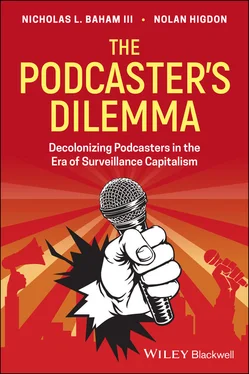Scholars have noted that decolonization produces counter-knowledge through the process of interrogation and critique. 38Similarly, Antonia Darder notes:
Central to the qualitative labor of a decolonizing interpretive approach are radical processes of social inquiry, critique, and cultural reformulation (or reinvention, as Paulo Freire would say) that strike at the very heart of dominant ideologies linked to persistent asymmetrical practices – practices that, wittingly or unwittingly, reproduce classed, racialized, gendered, sexual, abled, religious, and other social and material formations that sustain fundamental inequalities and exclusions. 39
Indeed, rather than remaining bivouacked, the podcasters we surveyed confront dominant ideologies through a process of inquiry, critique, and cultural reformulation that focuses on the expressions of power invested in identity. In this sense, to critique is to interrogate the values and beliefs that legitimize power and reveal its often hidden or opaque logic at work. 40“Interrogation” is a term often narrowly applied to discourses about law enforcement or state agents asking tough questions of captives. 41But, insofar as it relates to decolonization, the process of interrogation involves questioning sources of power rather than individuals. 42Decolonization uses interrogation as a means of deconstructing dominant power structures for the purposes of liberation 43– or, as Darder explains, interrogation “functions in the interest of deconstructing and reconstructing conditions for transformative practice and social empowerment.” 44
This process of deconstructing dominant cultural concepts and of stripping the colonizer’s language “of its negative connotations” necessitates more than interrogation and critique. It demands the production of counter-narratives that displace dominant ones. 45It involves moving concepts of the oppressed and the colonized from the margins to the center of the public square. A counter-narrative is “a story that resists an oppressive identity and attempts to replace it with one that commands respect.” 46Scholars have noted the critical association between counter-narratives and decolonization. For example, Darder observes that
critical research must be linked to emancipatory efforts to dismantle oppressive theories and practices, in an effort to transform existing conditions. This calls for a research process that can support the creation of intellectual and social spaces where alternative readings of the world can exist in the interest of liberatory practice and social justice. 47
The literature on decolonization emphasizes that decolonization is a process that ultimately leads to transformative “action.” 48Decolonization research is grounded in indigenous peoples’ demanding self-determination and using the decolonization process to achieve indigenous utopianism. 49Indigenous utopianism is an aspirational concept that refers to an ancient past, which activists seek to bring about in the present in the form of freedom and self-determination. 50Media are a powerful cultural force and, just as they can reinforce colonial mentalities, they can also offer a space of liberation from them.
To understand how podcasters were using their programs as spaces of decolonization, we randomly surveyed over one hundred podcasts that were identified through word searches in major podcasting websites such as Apple Podcasts and Spotify. We looked for podcasts that used concepts, themes, and language identified in the scholarship on decolonization. We then surveyed a sample of programs from each podcast and coded them to determine how, if at all, they engaged in the processes of interrogation and critique, counter-narrative, and action. We listened to a handful of their programs and read their descriptions, their host bios, and their listener comments. In addition, we had our interns help develop profiles for the podcast hosts so we could better determine who was behind the approaches to decolonization in the podcasting space.
We analyzed the content through a critical lens. Critical theory posits that dominant ideologies result from power inequities that are strengthened and fortified through media and communication. 51Critical scholars contend that identities – such as class, race, gender, sexuality, and ability – are an expression of power because they are primarily shaped according to dominant structures that maintain power imbalances. In fact isms such as sexism or racism are often incorrectly attributed to individual behavior rather than to the systemic forces that solidify power relations by reinforcing colonial mentalities. 52We used a critical lens because we are critical scholars and power is the defining feature of colonization. As a result, power makes for a useful lens in deciphering the dynamics of colonization in the podcasting space.
In order to help frame the narrative of podcasting as a space of decolonization, we fundamentally build on Frantz Fanon’s analysis of the decolonizing potential of radio communication in A Dying Colonialism (1965), a groundbreaking study of the methods employed by the Algerian resistance (FLN) in its armed struggle against French colonialism. We find that the appropriation of digital broadcasting technologies by marginalized groups engaged in decolonization is analogous to the appropriation of radio technology in 1954 in Algeria and in other significant decolonizing revolutionary movements from the post-World War II era to the present. Indeed, since Fanon’s work, a host of studies have examined radio as a tool for decolonization. 53Fanon’s work helps contextualize the revolutionary potential of podcasting.
A Word on Language and Citations
We have done our best in this text to provide direct citations to the content we reference. However, one of the issues we noticed is that many of the podcasts are accessible on webpages that are updated daily and weekly with new podcasts, and this may cause the podcast we referenced to be buried on another page. Furthermore, it means that we cannot directly link to a particular episode, but to an entire library. Where possible, we have tried to provide direct citation content or sources for our quotations. However, the messy and haphazard nature of podcasting, where the user-friendly ability to post and remove content is privileged over scholarly referencing, did present some difficulties that readers are sure to recognize.
Readers may have some difficulty with the language as well. For example, rather than discussing podcasting as “alternative” media and mass media as “mainstream,” we refer to the mass media as corporate media, in order to highlight the fact that they are funded by corporations and their messaging reflects the interests of corporatism. The present book is not the space to investigate this concept. That work has been accomplished by organizations such as Project Censored and in monographs such as Edward Herman and Noam Chomsky’s Manufacturing Consent: The Political Economy of the Mass Media and Nolan Higdon’s The Anatomy of Fake News: A Critical News Literacy Education . We encourage readers who are interested in the influence of corporate funding on media content to explore the suggested titles and organizations. Similarly, we refer to “decolonial” podcasts. This is a term by which we describe the podcasters who are using the podcasting space to interrogate, critique, and offer counter-narratives to colonial mentalities – which include ones from corporatism, racism, sexism, homophobia, xenophobia, ethnocentrism, Islamophobia, and ableism (among the more prominent categories).
This text chronicles the dynamic rise of podcasts that seek decolonization from the dominant ideological structures. In order to identify the podcasts participating in decolonization, we did an Internet search of podcasts that specifically mentioned a focus on identities of class, race, gender, sexuality, and ability. We wanted to see how these identity groups were using podcasting as a way to decolonize themselves – that is, to free themselves from colonial mentalities. An Internet search resulted in a list of over 100 podcasts, which are profiled in Chapter 1.
Читать дальше












